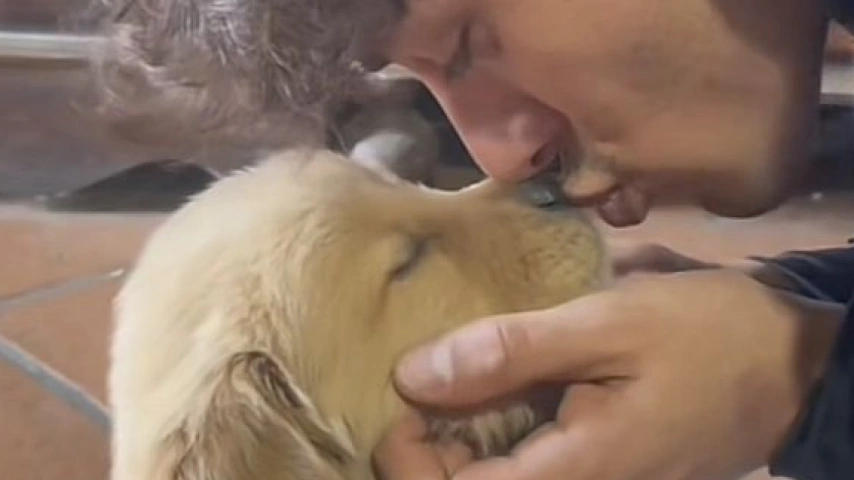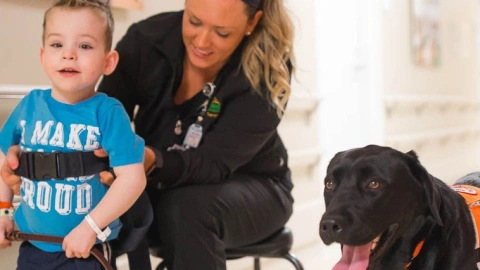Dog / Detail
Oxytocin: The Love Hormone That Shapes Canine Relationships
Jonathan Bennet | 16 September 2024 | 18:05
Oxytocin can significantly influence a dog's feelings of love, loyalty, and attachment.
Oxytocin, often referred to as the "love hormone," plays a pivotal role in social bonding and attachment across various species, including humans and dogs. This neurotransmitter, produced in the hypothalamus and released into the bloodstream, has been linked to a wide range of behaviors, from trust and empathy to aggression and fear.

In the context of human-dog relationships, oxytocin can significantly influence a dog's feelings of love, loyalty, and attachment.
The Science of Oxytocin
Oxytocin is a complex hormone with a multifaceted role in the brain. It is involved in various physiological processes, including childbirth, lactation, and social bonding. In humans, oxytocin has been associated with feelings of love, trust, and empathy. Similar effects have been observed in dogs.
- Social Bonding: Oxytocin plays a crucial role in the formation of social bonds. Studies have shown that increased oxytocin levels are correlated with stronger social attachments between dogs and their human companions.
- Stress Reduction: Oxytocin can help reduce stress and anxiety, which can contribute to a positive and harmonious relationship between a dog and its owner.
- Empathy and Trust: Oxytocin has been linked to increased empathy and trust in both humans and dogs. This can foster a deeper connection and understanding between the two species.

The level of oxytocin in a dog's brain can significantly influence its behavior toward humans. High levels of oxytocin are often associated with positive behaviors, such as:
- Loyalty and Attachment: Dogs with higher oxytocin levels may exhibit stronger loyalty and attachment to their owners.
- Affectionate Behavior: Oxytocin can contribute to affectionate behaviors, such as cuddling, licking, and tail wagging.
- Cooperative Behavior: Dogs with high oxytocin levels may be more cooperative and easier to train.
Conversely, low levels of oxytocin can be linked to negative behaviors, including:
- Aggression: Dogs with low oxytocin levels may be more prone to aggression or fear-based behaviors.
- Anxiety: Reduced oxytocin levels can contribute to anxiety and stress, which can lead to various behavioral problems.
- Social Isolation: Dogs with low oxytocin may struggle to form strong social bonds with other dogs or humans.

Several factors can influence a dog's oxytocin levels, including:
- Positive Interactions: Engaging in positive interactions, such as petting, playing, and providing praise, can increase oxytocin levels in both dogs and humans.
- Stress and Anxiety: Chronic stress and anxiety can reduce oxytocin levels. It is essential to manage stress and anxiety in dogs to maintain healthy oxytocin levels.
- Genetics: Genetic factors may play a role in individual differences in oxytocin levels and behavior.
- Early Socialization: Early socialization experiences can influence a dog's oxytocin levels and its ability to form social bonds.

To foster positive interactions and enhance oxytocin levels in your dog, consider the following strategies:
- Regular Exercise: Physical activity can help reduce stress and anxiety, which can positively impact oxytocin levels.
- Positive Reinforcement Training: Use positive reinforcement techniques to reward your dog for good behavior and build a strong bond.
- Playtime: Engaging in playful activities with your dog can increase oxytocin levels and strengthen your relationship.
- Massage: Gentle massage can help reduce stress and promote relaxation, which can contribute to higher oxytocin levels.
- Socialization: Expose your dog to a variety of people, dogs, and environments to help them develop strong social skills.
Related
-

The Healing Power of Dogs: How Canine Therapy is Revolutionizing Mental Health and Boosting Positive Energy in Humans
Dog14 November 2024
-

A Pawsitive History: Dogs of Nuremberg
Dog09 November 2024
-

The Role of Oxytocin in the Human-Dog Bond: The Science Behind Our Deep Connection
Dog06 November 2024
-

Beyond the Beach: Jamaica's Dog Lovers
Dog29 October 2024
-

A Dog's Delights: Homemade Snacks for Our Furry Babies, Recipes Included!
Dog29 October 2024
-

A Dog's Disorientation: Understanding Your Dogs' Wanderlust
Dog29 October 2024
Popular
-

-

A Pawsitive History: Dogs of Nuremberg
09 November 2024 -

-

Beyond the Beach: Jamaica's Dog Lovers
29 October 2024 -
